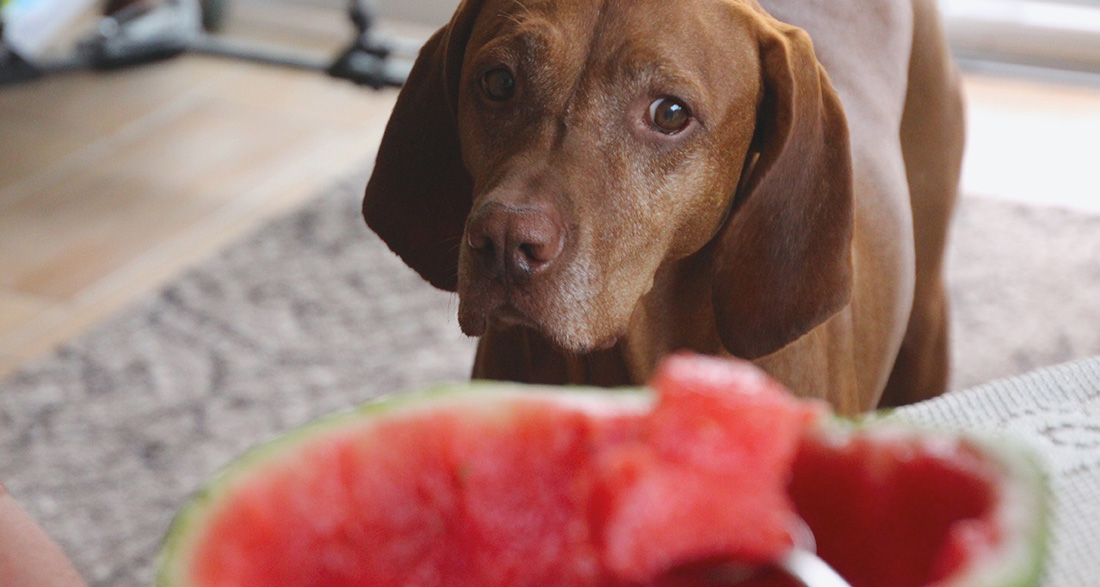Adults and children love watermelon, especially in the summer when it’s hot. Many four-legged friends also enjoy watermelon. Dogs are allowed to eat watermelon occasionally, but there are a few things to consider to make it a healthy addition to their diet.
Can Dogs Eat Watermelon?
Yes, the answer to this question is yes. Dogs can eat watermelon. However, you should only give your four-legged friends the red flesh of the melon without seeds to eat. This is harmless and well-tolerated, with several positive effects on the dogs’ health.
Healthy Aspects of Watermelon for Dogs
Watermelons contain a significant amount of potassium and vitamin C. Potassium plays a crucial role in various cellular metabolic processes, and the body needs it for a healthy heart muscle function and nerve impulse transmission. Vitamin C strengthens the immune system and is necessary for collagen formation. Collagen is the main component of bone, tooth, and connective tissue. Additionally, watermelons have a high fiber content, supporting healthy digestion. Moreover, fiber helps dogs absorb the sugar from watermelon slowly, preventing a sudden spike in blood sugar levels.
Watermelon is 92 percent water, making it suitable for dogs, especially in warm weather. Dogs appreciate this fresh snack in between meals.
As a treat, watermelon is suitable for dogs of all ages. However, if you feed your dog complete dog food, you generally don’t need to worry about additional nutrient intake. Good complete dog food already contains all the essential nutrients your furry friend needs and does not require additional supplements.
No Peel or Seeds for Dogs
As delicious as watermelon is, it can harm your dog if you feed it the wrong parts of the fruit. You must remove the green peel beforehand, and seeds are also off-limits for dogs. The consumption of the peel often leads to gastrointestinal disturbances, as it is hard to digest, and commercially available melons are often treated with chemicals. Symptoms such as diarrhea, vomiting, and abdominal pain may occur. The peel is not palatable and is tough, making it challenging for dogs to chew.
Under no circumstances should your dog eat watermelon seeds. Consumption can lead to a potential intestinal obstruction. In the worst case, an intestinal obstruction occurs when either the colon or the small intestine is completely blocked, preventing food from passing through. A dog with an intestinal obstruction experiences severe pain. If veterinary treatment is delayed, an intestinal obstruction can end fatally. The risk threshold depends on the size and weight of your dog. Even a small amount poses a high risk for smaller dogs.
Thoroughly remove all seeds from the melon and cut off the peel before offering your dog the melon flesh snack or adding it to the food bowl. The same applies to cantaloupe.
Feeding Watermelon for the First Time
Every dog has an individual stomach. Even if your dog can generally eat watermelon, it’s still possible that they may have an allergy or intolerance. Therefore, for the very first taste, give your dog only a small piece of the melon and observe them afterward. Allergies come with a range of physical symptoms. If your furry friend shows the following signs, it indicates an allergy, and you should avoid feeding them watermelon:
- Intense itching
- Skin changes (such as rash or redness)
- Inflammation
- Digestive issues (such as diarrhea and vomiting)
Severe symptoms require a visit to the veterinarian’s office. There, your four-legged friend will receive proper treatment, and the vet will help you make an accurate allergy diagnosis.


